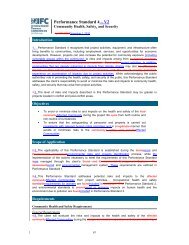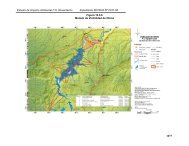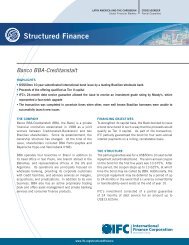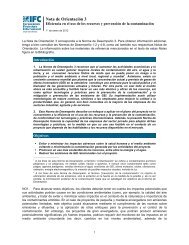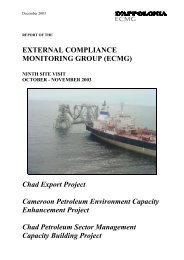Corporate Governance for Banks in Southeast Europe: Policy - IFC
Corporate Governance for Banks in Southeast Europe: Policy - IFC
Corporate Governance for Banks in Southeast Europe: Policy - IFC
Create successful ePaper yourself
Turn your PDF publications into a flip-book with our unique Google optimized e-Paper software.
E. Additional In<strong>for</strong>mation from EBRD SEE Bank Assessments<br />
E1. Board structures <strong>in</strong> SEE<br />
Albania<br />
Jo<strong>in</strong>t stock companies <strong>in</strong> Albania have the option to choose either a one-tier or two-tier system. In the latter<br />
case, management board members can be elected and dismissed by the general shareholders meet<strong>in</strong>g or by<br />
the supervisory board, as provided by the charter. The Law on <strong>Banks</strong> requires banks to be organized under<br />
a two-tier system, where the general shareholders’ meet<strong>in</strong>g appo<strong>in</strong>ts both a supervisory board (“steer<strong>in</strong>g<br />
council”) and the members of the management board (“directorate”). The steer<strong>in</strong>g council is the bank’s<br />
decision-mak<strong>in</strong>g and supervisory body. At least one-third of its members must not be related to controll<strong>in</strong>g<br />
shareholders or to the bank’s management board members. Members of the directorate can also sit on the<br />
steer<strong>in</strong>g council, but they should not be <strong>in</strong> the majority.<br />
Bosnia and Herzegov<strong>in</strong>a<br />
<strong>Corporate</strong> governance and bank<strong>in</strong>g <strong>in</strong> Bosnia and Herzegov<strong>in</strong>a is regulated at the entity level. In practice,<br />
two dist<strong>in</strong>ct corporate governance regimes exist and each entity has its own framework of primary and<br />
secondary legislation and a Bank<strong>in</strong>g Agency. In both the Federation of Bosnia and Herzegov<strong>in</strong>a and <strong>in</strong><br />
the Republika Srpska, the Law on <strong>Banks</strong> requires f<strong>in</strong>ancial <strong>in</strong>stitutions to have a supervisory board and a<br />
management board. The latter is appo<strong>in</strong>ted by the general meet<strong>in</strong>g of shareholders and is responsible <strong>for</strong> the<br />
supervision of the bus<strong>in</strong>ess operations of a bank. The management board is appo<strong>in</strong>ted by the supervisory<br />
board and is responsible <strong>for</strong> the direct bus<strong>in</strong>ess operations of the bank. The supervisory board must appo<strong>in</strong>t<br />
an audit committee consist<strong>in</strong>g of five members <strong>for</strong> a term of four years. Members may be reappo<strong>in</strong>ted. Audit<br />
committee members cannot be bank staff or members of the supervisory or management boards.<br />
Bulgaria<br />
Bulgarian jo<strong>in</strong>t stock companies, <strong>in</strong>clud<strong>in</strong>g public companies and banks, can opt <strong>for</strong> a one-tier system<br />
or a two-tier system. In l<strong>in</strong>e with Article 41 of the 8th EU Company Law Directive, the Law on F<strong>in</strong>ancial<br />
Independent Audit requires public <strong>in</strong>terest companies (<strong>in</strong>clud<strong>in</strong>g banks) to establish an audit committee. In<br />
listed companies and banks, one-third of board members must be <strong>in</strong>dependent.<br />
Detailed rules on <strong>in</strong>dependent board members are <strong>in</strong>cluded <strong>in</strong> the National Code of <strong>Corporate</strong> <strong>Governance</strong>.<br />
F<strong>in</strong>ally, the Law on Credit Institutions promulgated <strong>in</strong> July 2006 requires banks to regularly review their<br />
organizational structure and the procedure <strong>for</strong> def<strong>in</strong><strong>in</strong>g and delegat<strong>in</strong>g powers and responsibilities of board<br />
members.<br />
Croatia<br />
In Croatia, the Companies Act allows jo<strong>in</strong>t stock companies to choose between one-tier or two-tier board<br />
systems. Accord<strong>in</strong>g to the Credit Institutions Act, banks are required to establish a management board and a<br />
supervisory board. The Act requires the supervisory board to have at least one <strong>in</strong>dependent member. There<br />
are no specific requirements <strong>for</strong> board committees, although the Act expressly provides report<strong>in</strong>g duties by<br />
<strong>in</strong>ternal audit to the audit committee. On the other hand, the <strong>Corporate</strong> <strong>Governance</strong> Code recommends that<br />
boards <strong>in</strong> listed companies and banks establish nom<strong>in</strong>ations, remuneration, and audit committees with a<br />
majority of <strong>in</strong>dependent board members.<br />
FYR Macedonia<br />
In FYR Macedonia, banks are governed under a two-tier system, where the general shareholders meet<strong>in</strong>g<br />
appo<strong>in</strong>ts the supervisory board, and the latter appo<strong>in</strong>ts and removes the members of the management<br />
68<br />
<strong>Policy</strong> Brief<br />
<strong>Corporate</strong> <strong>Governance</strong> <strong>for</strong> <strong>Banks</strong> <strong>in</strong> <strong>Southeast</strong> <strong>Europe</strong>



